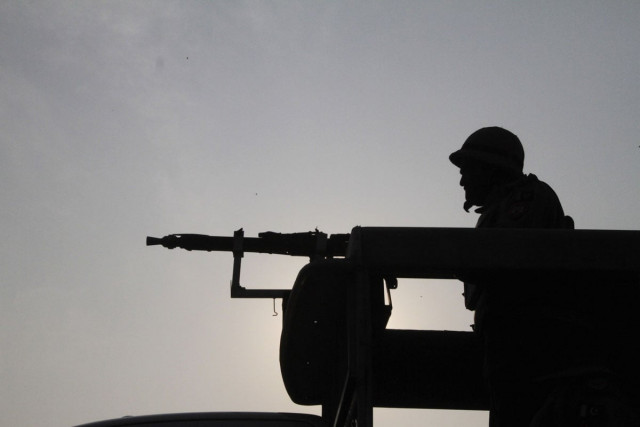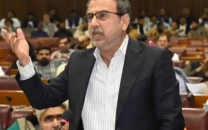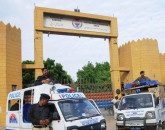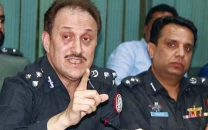Tackling security challenges in 2013
Pakistani state, society have to realise that result of war fought within will determine nature of state.

Pakistani state, society have to realise that result of war fought within will determine nature of state. PHOTO: REUTERS/FILE
Pakistan is at war within and facing security challenges without. Both are linked at many levels. This was the story of 2012 and the years preceding it; this, in a nutshell, will be the story of 2013.
Despite years of pain, not much has been done to study these threats and their interactive dynamics. The government has mostly reacted tactically, trudging from crisis to crisis with nary a thought to connecting the dots and formulating a longer-term strategic response – with the exception, mercifully, of foreign policy.
Three challenges stand out internally (not an exhaustive list): terrorism and extremism, political instability and a dwindling economy. While the military has continued to launch small-to-medium scale operations in the troubled Federally Administered Tribal Areas (Fata), counterterrorism (CT) efforts in the urban centres remain a weak spot for a simple reason – the civilian law enforcement agencies, as currently structured, cannot handle the challenge.
They neither have the equipment nor the training for it. No effort, apart from creating some specialised cells within the police and the Federal Investigation Agency – inadequate at best – has been made to reconfigure the police or, alternatively, create a force dedicated to CT operations.
Additionally, despite the National Database and Registration Authority (NADRA) database, law enforcement agencies are not linked to a mainframe. No protocols have been established for fast-paced investigations and pre-emption, even as checkpoints have increased with little results.
More than half the police force is deputed on VVIP security even as normal policing and CT functions continue to suffer. Any government will have to understand that military operations will beget reprisals in urban centres and the only effective response to urban terrorism is to raise and train an effective civilian CT force.
As for coordinating the efforts of various agencies, an absolute necessity, the country needs an umbrella organisation. The National Counter-Terrorism Authority, conceived for this purpose, remains alive only on paper. That must change.
Extremism is another threat. While it is linked to terrorism at many levels, it is also independent of it at the broader social level. Sectarian killings are an expression both of terrorism and an extremist, exclusionary ideology. Similarly, on the issue of blasphemy, the response of an average Pakistani evinces the extremism that has seeped into the society.
In the long term, the fight against terrorism cannot be won decisively until the society is purged of extremism. The registration of seminaries, changes in the syllabi, appropriate legislation and effective law enforcement response to vigilante mobs are some of the many steps that need to be taken.

The dwindling economy necessitates that the country get outside help to refashion itself both economically and socially. The foreign policy initiatives of 2012 betoken a positive trend. Zero conflict in the region and integrating Pakistan in the world through trade and investment are the two pillars of the new foreign policy. However, terrorism continues to threaten foreign policy initiatives within and outside the region, the classic Catch 22.
The year 2012 also saw some positive institutional trends. The opposition dealt with the government with a kick but continued to observe democratic norms.
The executive-judiciary standoffs resulted in both sides appreciating their institutional limits. A new chief election commissioner was nominated and the 20th Constitutional Amendment saw a consensus on the formation of a caretaker government.
However, just near the year’s end, we have seen ominous signs that extra-political forces in combination with some political forces might be contemplating pushing the country into another experiment with a longer-term caretaker/national government.
If that does come to pass this year, it will be a setback for a smooth democratic transition and political stability, and will also throw into a tailspin the fight against terrorism, efforts to revive the economy and the foreign policy initiatives taken so far.
The challenges also offer the proverbial opportunities. In any case, the Pakistani state and society have to realise that the result of the war being fought within will determine the nature of this state and its relations with the rest of the world. The policymakers in the government will need to understand that the ultimate survival of everyone lies in dealing with the fault-lines. This year will see the cost of inertia or any experimentation rise exponentially. Pakistan can afford neither as it gets down to the task of serious policymaking in areas of concern.
The writer serves as Senior Advisor, Policy Outreach at the Sustainable Development Policy Institute, Islamabad
Published in The Express Tribune, January 1st, 2013.


















COMMENTS
Comments are moderated and generally will be posted if they are on-topic and not abusive.
For more information, please see our Comments FAQ